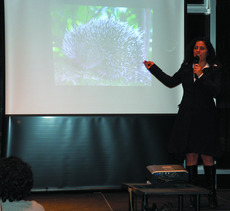There is an unlisted subject at Loyola University many students study with more ferocity than their own majors – sex.
While the desire to “ride that streetcar” is present, the knowledge of proper riding safety always isn’t. With President Bush’s support of abstinence-only sex education and the general taboo concerning the subject, government studies show that students find themselves lost when it comes to contraceptives, sexually transmitted diseases and sexual health.
The University Programming Board observed students’ requests for sexual awareness after conducting a survey on what types of events students would be interested in. After researching several specialists, UPB contacted sexologist Dr. Sonia Borg to speak at Loyola.
Borg tours universities with her lecture “Sex, Let’s Talk About It,” and received a Ph.D. in human sexuality and two MDs in Speech Communication and Public Health. In addition to lecturing at colleges across the country, Borg has offered her expertise to Playboy Radio, Good Morning San Diego and the Discovery Channel. On March 8, Braxton Bernard, marketing sophomore and Informed Chairperson of UPB, introduced Borg to a congregation of students in the St. Charles Room.
“Sex, let’s talk about it,” Borg said, reiterating the title of her program. “If we don’t want to talk about something, we don’t get the information that we need.”
Inexperience can be a problem, she said. “But not talking about sex is an even bigger problem.” While she opposes abstinence-only sex education, saying it had no long-term proof of effectiveness, Borg praised abstinence itself, which is “beautiful if it’s an informed choice that you made.” Borg’s fervor for sexual education stems from her own experiences as a sexually active college student.
After contracting and recovering from Hepatitis B, Borg said she had her “wake up call” and determined she would dedicate her life to educating others about the facts that were unavailable or were simply not discussed. She attributed most acts of unprotected sex to alcohol, saying if students consume one to four drinks, they are three times as likely to have unprotected sex. That number is increased to nine times after consuming five or more drinks, she said. According to Borg’s research, about 29 percent of college students used a condom during their last sexual encounter.
“These numbers break my heart,” she said, “because they are totally unnecessary.”
Borg discussed the necessity of contraception, even awarding a student $20 for presenting her with a condom he carried in his wallet, reiterating the adage “no glove, no love.” She attributed society’s discomfort with sexual discussion to the Puritanical concepts on which the nation was founded where “the only legitimate source of sex was for procreation.”
To the amusement of students, Borg read health documents from 1918 saying masturbation caused loss of memory, blindness, insomnia, fatigue, insanity, emaciation and death. She refuted these statements with her own, saying sexual stimulation reduces stress, lowers the rate of cancer and heart disease and acts as a pain reliever.
“Everyone has the same rights and responsibilities despite their view of sex or sexual orientation,” Borg said to conclude her presentation. “Everyone has the right to a healthy and happy sex life. I encourage you to talk with your partners about your experiences and about what sex means to you. Talk about it with your friends. That is the only way to spread your knowledge: Talk about sex.”
“Dr. Borg did a great job,” Bernard said. “It’s (sex ) a topic that we don’t often hear talked about on campus or in class. I think that education in any capacity, on any subject, is a positive thing. The truth can’t hurt you.”
Justin Templet can be reached at jatemple@loyno.edu.






